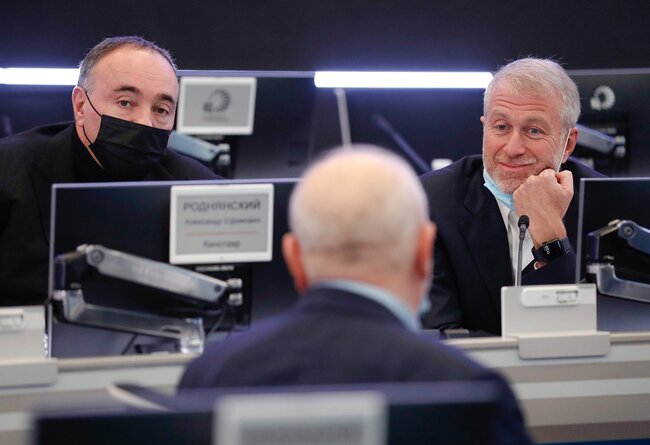Russia’s Oscar rigging, Solovyov’s praise for Zelensky, and a Putin ideologist’s Obama portrait. What we learned from Ukrainian producer Alexander Rodnyansky’s new memoir
Manage episode 492421974 series 3381925
Russia’s Oscar rigging, Solovyov’s praise for Zelensky, and a Putin ideologist’s Obama portrait
What we learned from Ukrainian producer Alexander Rodnyansky’s new memoirIn late 2024, Meduza’s publishing house released a memoir by Ukrainian film producer Alexander Rodnyansky titled Loveless: Putin's Russia in Nine Films. In the book, Rodnyansky recounts his experiences as a key figure in the Russian and Ukrainian film industries over the past decades. He covers the early days of the Ukrainian TV channel 1+1, where Volodymyr Zelensky’s political career began; examines how self-censorship has shaped Russian cinema under Putin; and reveals insights into Russia’s cultural landscape at the beginning of the full-scale war. Literary critic Liza Birger highlighted 13 little-known or surprising facts from the new volume. We’ve translated a selection of them into English below.
Russian propagandist Vladimir Solovyov predicted the full-scale war in fall 2021 (and called Zelensky ‘a likable guy’)
In early fall 2021, at Sochi Airport, Alexander Rodnyansky happened to run into one of Russia’s preeminent propagandists, Vladimir Solovyov, who was returning from Moscow after interviewing Putin. To Rodnyansky’s surprise, Solovyov said, “Listen, there’s going to be a war.” When Rodnyansky responded in disbelief, “Come on — what war?” Solovyov insisted: “There definitely will be a war, believe me. I don’t see anything good in it. It’s terrible.”
According to Rodnyansky, Solovyov explained that Putin felt personally offended by Zelensky and no longer saw any possibility of a deal. “It’s a shame,” Solovyov added. “Zelensky is a likable guy.”
The encounter stands in sharp contrast to Solovyov’s public statements today, in which he calls Zelensky a “führer” and a “druggie.”
Alexander Rodnyansky played a key role in shaping Zelensky’s political career
Volodymyr Zelensky’s path to the presidency began at Ukraine’s top TV channel, 1+1 — whose first head was Alexander Rodnyansky. The network was commercially independent, with a 50 percent stake owned by Rodnyansky and his cousin, businessman Boris Fuksman, and the other 50 percent by the American media company CME.
Additionally, in Rodnyansky’s own words, 1+1 “consistently introduced the young nation to the Ukrainian language and the new market reality and helped foster a competitive political environment — factors that laid the groundwork for Zelensky’s political career.”
Rodnyansky was tasked with finding a mediator for peace talks on the first morning of Russia’s full-scale invasion
The second person to call Rodnyansky on February 24, 2022, was Andriy Yermak, head of the Ukrainian president’s office. Yermak asked him to identify a businessman close to Putin who could help facilitate negotiations and seek a peaceful resolution to the war.
Rodnyansky named the only candidate he thought suitable: businessman Roman Abramovich, “who’s incredibly successful, widely known, and very honorable.” Abramovich later played a behind-the-scenes role in organizing the March 2022 talks in Turkey, although those efforts ultimately failed to produce a ceasefire.

Rodnyansky was once blacklisted in Russia after a film of his sparked a scandal because of a scene featuring two portraits (you can probably guess whose)
Directed by Pavel Bardin, the 2009 film Russia 88 told the story of a gang of Russian neo-Nazis. The film was a dark reinterpretation of Romeo and Juliet, with one key difference: the central character was Tybalt, reimagined as a skinhead and neo-Nazi.
The controversy erupted over a scene set in a makeshift basement gym, where, as the police burst in, a portrait of Hitler was flipped over to reveal a portrait of Putin on the back. Then–presidential aide Vladislav Surkov was reportedly “genuinely outraged” and accused Rodnyansky of disloyalty, saying, “You’re the one handing out medals to the Banderites in your own homeland.” Surkov personally called Russia’s culture minister, the head of the Russian Cinema Fund, and the country’s TV executives, pressuring them to cut all ties with Rodnyansky. As a result, Rodnyansky was excluded from state funding programs for several years.
Ukrainian TV once operated under a system of government-issued ‘talking points’ — but during the Orange Revolution, journalists pushed back
In the mid-2000s, 1+1 was not politically independent. Under pressure from the authorities, who threatened to revoke its broadcasting license and filed lawsuits against it, the channel’s editorial policy came under the control of the presidential administration. From then on, the editorial team received weekly instructions outlining “what we can talk about on air, what we should avoid, who we’re allowed to invite to talk shows, and who we aren’t.”
This changed during the 2004 Orange Revolution. TV hosts began appearing on air wearing orange scarves — the color of opposition candidate Viktor Yushchenko’s campaign — and staff wore orange to editorial meetings. In a bold move that “broke all imaginable rules,” the channel also aired news coverage from a competitor broadcasting live from Yanukovych’s headquarters.
For three days, the news was anchored solely by the editor-in-chief, as “there was no one else to do it.” Then, on November 25, 2004, Rodnyansky addressed viewers live on air, declaring that from now on, “only the 1+1 editorial team and management will determine the content of our news,” and promising to provide “complete and unbiased” information. Within a week, the channel’s audience nearly doubled.
The film Leviathan was partly inspired by the story of American repair shop owner Marvin Heemeyer and his infamous ‘Killdozer’ bulldozer
In 2008, while filming in New York, Russian director Andrey Zvyagintsev heard the story of Marvin John Heemeyer, a repair shop owner from Granby, Colorado. On June 4, 2004, Heemeyer used a custom-built armored bulldozer to destroy 13 government buildings before taking his own life. His rampage was the violent culmination of a long-running dispute with a concrete company that had expanded onto his property with the support of local officials.
A different era
The story became the starting point for a draft script titled Batya, though the project was eventually abandoned. Zvyagintsev and his co-writer Oleg Negin felt uneasy about how Heemeyer’s story ended. To them, it seemed “too American” and didn’t fit the Russian worldview, which they saw as shaped by a philosophy of endurance — the ability to suffer endless humiliation.

Former top Kremlin ideologue Vladimir Surkov kept a photo of Barack Obama in his office
In 1988, Rodnyansky first saw the future Kremlin ideologist Vladislav Surkov at a gathering of Russian rock fans in Kyiv. At the time, the Ukrainian capital was home to a vibrant community that regularly attracted visiting Russian rock enthusiasts, who would gather to listen to music, smoke weed, and talk for hours. By today’s standards, it was a familiar scene, but back then, they stood out as true “Westernizers” — free-spirited and defiant.
Even though we’re outlawed in Russia, we continue to deliver exclusive reporting and analysis from inside the country.
Our journalists on the ground take risks to keep you informed about changes in Russia during its full-scale invasion of Ukraine. Support Meduza’s work today.
According to Rodnyansky, even when he later became the Kremlin’s shadowy power broker, Surkov “remained true to the spirit of rock ’n’ roll for many years.” His office in the presidential administration building featured photos of John Lennon, Tupac Shakur, Che Guevara, and Barack Obama. While managing the Kremlin’s ideological strategy, he also wrote songs with Vadim Samoylov, co-founder of the rock back Agatha Christie, and published a provocative novel under a pseudonym titled Almost Zero.
Russia’s 2012 Oscar submission was chosen at the last minute — thanks to a rigged vote
In 2012, the main contenders to represent Russia at the Oscars were the films Elena by Andrey Zvyagintsev and Faust by Alexander Sokurov, “a remarkable artist who had never been submitted for an Oscar.” Faust had just won the top prize at the Venice Film Festival. “It could have been a fair and open competition,” Rodnyansky writes, and at first, the votes were evenly split.
But at the critical moment, Vladimir Menshov, head of Russia’s Oscar committee, “simply pulled five or six proxy votes out of his briefcase, signed by committee members who hadn’t even shown up to the meeting.” All the votes went to White Tiger, “a film nobody outside Russia had ever heard of,” which had flopped at the Russian box office but happened to be directed by a political heavyweight, Mosfilm’s Karen Shakhnazarov.
The film made it onto the Academy’s longlist, but its Oscar campaign ended there.
Just before the full-scale war, Rodnyansky signed a deal with Apple and was planning an international project called Global Russian Stories
Shortly before Russia’s full-scale invasion of Ukraine in 2022, Alexander Rodnyansky signed a first-look deal with Apple TV+. Additionally, he was in talks with European and Russian companies about a project called Global Russian Stories — a series of films and shows that would be “universal, meaning accessible to audiences worldwide, but rooted in Russian history and contemporary life.” The plan was for Russian streaming platforms to hold distribution rights for Russian-speaking audiences, while Rodnyansky would secure “partners, significant investment, and a strong negotiating position” with Western buyers.
Among the projects in development were Red Rainbow, a tragicomedy about a visit by German gay activists to homophobic Moscow in 1978, and The Black Russian, a film about the Black entrepreneur who opened Moscow’s first jazz club in the early 20th century. “Neither I nor any of my colleagues or partners believed disaster was inevitable,” Rodnyansky reflects. “War, sanctions, exile — it all seemed unimaginable. On the contrary, I thought it would be a ‘time of change’ for me.”
Original list by Liza Birger
73 episodes




